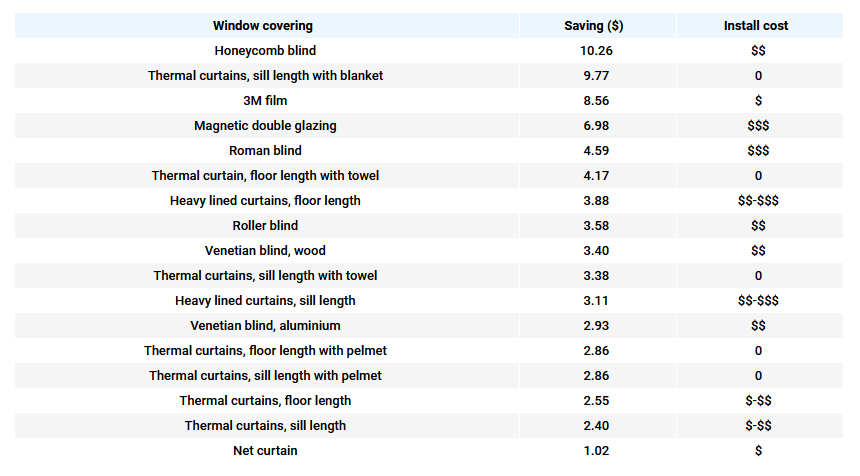Curtains & Blinds: Which types are best?
When it’s time to replace your curtains, most of us only worry about cost and style. But did you know this choice can make a massive difference to how warm and comfortable your home will be over winter? We tested which types were most effective at reducing heat loss in your home.
The problem: If you have an insulated house, you can lose upwards of 45% of your heat through your windows. This drops to 30% in an uninsulated home, since it’s easier for heat to escape through the walls, ceiling and floors. This shows the importance of choosing wisely when it comes to your curtains or blinds; the right window coverings can save two-thirds of the heat lost through your windows.
Our test: We measured heat loss through an aluminium-framed single-glazed window fitted with different window coverings. The window was fitted to a mini-room inside our Thermal Comfort lab. The lab temperature was reduced to 4°C to simulate a chilly winter night, while an electric heater inside the mini-room beavered away to maintain a temperature of 20°C.
The different window coverings were tested for at least three hours and we measured the total power usage from the heater, along with the difference between indoor and outdoor temperature. These readings were then used to calculate how effective each window covering was at stopping heat escaping.
Reverse chimneys: Cool air is denser (heavier) than warm air. When it’s cold outside, the inside air close to a window pane is cooled and tends to sink. As this cooled air sinks, it gets replaced by warmer air from other of the room. This creates a circulating air current that cools the room parts.
Curtains that aren’t sealed at the top or bottom to stop these air currents can make the situation worse by forming a channel between the window and curtain. This allows cooled air to flow continuously and chill the room faster.
We tested two types of curtains, thermal and heavy lined, cut to both sill and floor length. The thermal curtains were in a single drop and had a plastic coating bonded to the fabric. You might have expected the thermal curtains would perform better, but the extra layer of fabric in the pricier heavy lined curtains made them better insulators. If you’re getting curtains fitted, opt for floor-length as they keep in heat better than ones that sit at the sill.
Which blinds are best?
We tested five types of blinds: honeycomb, roman, roller, and aluminium and wooden venetians.
Our blinds were installed within the window frame (with the exception of the romans), so there was no gap (like the one between the back of the curtain and the window frame) to allow a reverse chimney to form. Honeycomb blinds easily topped our testing for all window coverings. Air is a good insulator, as long as it’s not moving, and the honeycomb structure creates a large, still air gap between the cold window pane and the warm inside air.
Also, the honeycomb blinds fitted closer to the sides of the window frame than our other tested blinds, which also helped reduce heat loss.
While their public baths may have gone out of fashion, roman blinds are still going strong. Roman blinds were the best window covering after the honeycomb blinds and secondary double-glazing options. A roman blind’s good performance comes down to the close fit it has over the window frame. This good seal, along with a close fit to the wall at the top, helps retain heat.
Keep reading: www.curtainclean.co.nz...

Poll: Are Kiwis allergic to “exuberance”? 🥝
In The Post’s opinion piece on the developments set to open across Aotearoa in 2026, John Coop suggests that, as a nation, we’re “allergic to exuberance.”
We want to know: Are we really allergic to showing our excitement?
Is it time to lean into a more optimistic view of the place we call home? As big projects take shape and new opportunities emerge, perhaps it’s worth asking whether a little more confidence (and enthusiasm!) could do us some good.

-
41.4% Yes
-
32.3% Maybe?
-
26.3% No
Brain Teaser of the Day 🧠✨ Can You Solve It? 🤔💬
How many balls of string does it take to reach the moon?
(Peter from Carterton kindly provided this head-scratcher ... thanks, Peter!)
Do you think you know the answer? Simply 'Like' this post and we'll post the answer in the comments below at 2pm on the day!
Want to stop seeing these in your newsfeed? No worries! Simply head here and click once on the Following button.

Poll: Are our Kiwi summer holidays helping us recharge, or holding the economy back? ☀️🥝
There’s growing debate about whether New Zealand’s extended Christmas break (and the slowdown that comes with it) affects productivity.
Tracy Watkins has weighed in ... now it’s your turn. What’s your take? 🤔

-
72.8% We work hard, we deserve a break!
-
16% Hmm, maybe?
-
11.2% Yes!






 Loading…
Loading…








